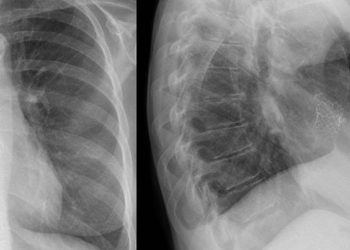Transcatheter tricuspid-valve replacement provides mortality and quality of life benefits
1. In this randomized controlled trial, a transcatheter tricuspid-valve replacement provided a mortality benefit compared to standard medical therapy after 1-year in patients with severe tricuspid regurgitation.
2. Transcatheter tricuspid-valve replacement was associated with an improvement in patient-reported quality of life and NYHA classification.
Evidence Rating Level: 1 (Excellent)
Study Rundown: Patients with severe tricuspid regurgitation experience debilitating symptoms, yet isolated tricuspid valve surgery remains uncommon. Tricuspid transcatheter edge-to-edge repair (T-TEER) has demonstrated efficacy in reducing regurgitation; however, residual regurgitation often persists. In contrast, transcatheter tricuspid valve replacement has been associated with lower levels of post-operative regurgitation, suggesting potential superiority over T-TEER. The TRISCEND II pivotal trial aimed to evaluate the safety and efficacy of treating symptomatic, severe tricuspid regurgitation using the EVOQUE tricuspid valve system. Compared to patients receiving medical therapy alone (control group), those undergoing transcatheter tricuspid-valve replacement therapy with medical therapy (valve-replacement group) were less likely to die from any cause at one-year post-treatment and required fewer adjunct tricuspid valve interventions. Additionally, valve-replacement group patients reported higher quality-of-life scores, as measured by the Kansas City Cardiomyopathy Questionnaire overall summary (KCCQ-OS). They also demonstrated greater improvement in NYHA functional class and six-minute walk distance. This trial was limited by an imbalance in participant numbers between groups, potential survival bias due to crossover after the one-year mark, confounding variables related to the etiology of tricuspid regurgitation, the overrepresentation of procedural complications during the early learning curve of providers, and limited generalizability to patients with multiple comorbidities. Despite these limitations, the study demonstrates both the efficacy and relative safety of transcatheter tricuspid-valve replacement.
Click here to read the study in NEJM
Relevant Reading: Early-Stage Results with Transcatheter Tricuspid-Valve Replacement
In-Depth [randomized controlled trial]: This randomized controlled trial aimed to evaluate the safety and efficacy of transcatheter tricuspid valve replacement for patients with severe, symptomatic tricuspid regurgitation. Eligible participants were required to be at least 18 years old, have severe tricuspid regurgitation, and either exhibit symptoms or have a history of hospitalization for heart failure despite adherence to medical therapy. A total of 400 patients were randomized, with 267 assigned to the valve replacement group and 133 to the control group. At the 1-year mark, the overall win ratio favoring valve replacement was 2.02 (95% confidence interval [CI], 1.56–2.62; p<0.001), calculated based on seven outcomes. Patients in the valve replacement group had better outcomes in five measures: death from any cause (14.8% vs. 12.5%), subsequent tricuspid valve intervention (3.2% vs. 0.6%), improvement in the KCCQ-OS (23.1% vs. 6.0%), improvement in NYHA functional class (10.2% vs. 0.8%), and improvement in 6-minute walk distance (1.1% vs. 0.9%). However, valve replacement patients had a slightly higher annualized rate of hospitalization for heart failure (9.7% vs. 10.0%). No patients in either group required right ventricular assist device placement or heart transplantation. At the one-year follow-up, 15.4% of valve replacement patients experienced severe bleeding, significantly higher than the 5.3% in the control group (p = 0.003). Valve replacement patients were also significantly more likely to develop arrhythmias and conduction disorders requiring permanent pacing (p < 0.001), with 27.8% of those without an existing pacemaker in the valve replacement group requiring a pacemaker or cardiac implantable device compared to 3.8% in the control group (p < 0.001). In summary, these results suggest that transcatheter tricuspid valve replacement may be an effective treatment for reducing mortality and improving quality of life in patients with severe tricuspid regurgitation, but its use should be carefully considered given the associated safety concerns.
Image: PD
©2025 2 Minute Medicine, Inc. All rights reserved. No works may be reproduced without expressed written consent from 2 Minute Medicine, Inc. Inquire about licensing here. No article should be construed as medical advice and is not intended as such by the authors or by 2 Minute Medicine, Inc.







